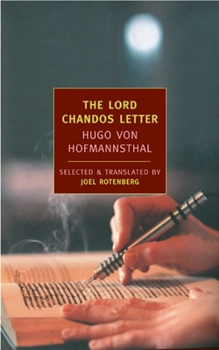The Lord Chandos Letter: And Other Writings
Select Format
Select Condition 
Book Overview
Hugo von Hoffmannsthal made his mark as a poet, as a playwright, and as the librettist for Richard Strauss's greatest operas, but he was no less accomplished as a writer of short, strangely evocative... This description may be from another edition of this product.
Format:Paperback
Language:English
ISBN:1590171209
ISBN13:9781590171202
Release Date:January 2005
Publisher:New York Review of Books
Length:152 Pages
Weight:0.46 lbs.
Dimensions:0.5" x 5.0" x 8.1"
Related Subjects
Anthologies Classics Contemporary Fiction Literature & Fiction Short Stories World LiteratureCustomer Reviews
2 ratings
The Epistle of Modernism
Published by Thriftbooks.com User , 17 years ago
In the supreme example of High Modernist irony, Hofmannsthal eloquently explains why he can no longer communicate. He is an exemplar for Kafka, Borges, Joyce, everyone.
Dreamworks
Published by Thriftbooks.com User , 18 years ago
This little book is rather difficult to review, for any number of reasons, not the least of which being that what are called the "stories" herein are not really stories at all in the common sense of the word but rather haunting, oneiric vignettes which end as abruptly as they begin - To call them impressionistic would be not only an understatement, but not quite right. - All the characters limned here live in a sort of dreamworld always accompanied by that indefinable, unlocalised sense of dread and foreboding one has in a dream. Thus, sometimes it seems to come from a well, or a barrel, or a golden apple or, in two instances, an encounter with a sort of doppelganger. It's as if the author had discovered some subaqueous realm lying just under normal sense experience and described it with the acute realism of Chekhov (of whom the intense detail in the stories reminded me) combined with the inner horror that Poe expresses at his best...except Hoffmannstahl expresses it better, but he couldn't bring himself (apparently) to complete a story of the kind that Poe wrote. Rather, we have these numinous dream-sequences filled with unnamable dread. It's as if, as Gerard De Nerval wrote of himself shortly before he committed suicide, the dream world was taking over "reality" in the author's mind, or, rather, has taken over. The "letter", tacked on to the end of these stories, supposedly explaining them, is interesting, but really doesn't tell us anything we can't glean from the stories. It's a manifesto of sorts, basically stating (and I simplify here) that language is incapable of explaining the numinous. Hoffmannstahl was something of an expert on light, and some of his best descriptions involve the effect of the lighting that lends a scene its all-encompassing "aura". In this, he very much reminds me of Emily Dickinson. I was constantly reminded while reading of her lines: A certain slant of light- Winter afternoons- Oppresses with the heft Of cathedral tunes. Well, I shan't go on. I'll leave the prospective reader with a quote from the narrator of "Tale of Two Couples" to give him/her and idea of what to expect: "I walked along like someone in a dream who is being touched by the atmosphere of his life and by the suspicion that he is dreaming." P.112 This is the effect throughout the book on the reader. Only four stars because it seems to me that Hoffmannstahl fails to give us anything but a dreamy patchwork of vignettes that lack any sort of meaning or continuity save in these oneiric, numinous flashes of dread and insight.....But, what blinding flashes they are!






